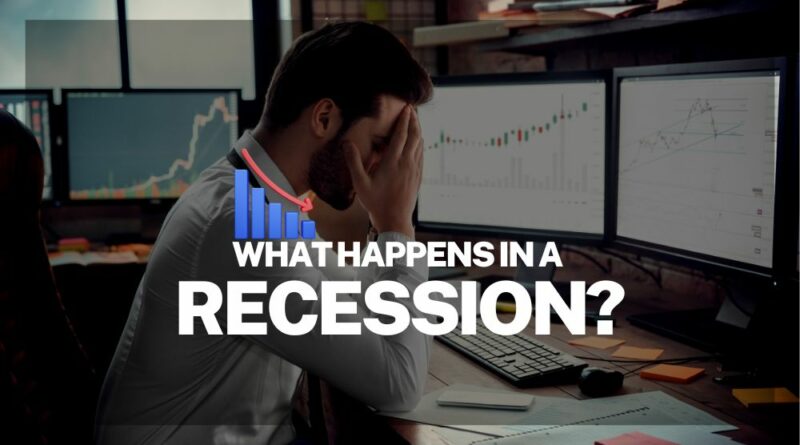What Happens in a Recession?
What happens in a recession?
Many people ask: what happens in a recession? A recession is a period when the economy faces a brief downturn. What causes a recession? This article will provide a general overview of what a recession is, how it affects the economy, and the factors that influence its occurrence.
There are many factors that can contribute to a recession. Some common causes include:
- When a central bank raises interest rates in a bid to slow down inflation. It can slow down the economy and even cause a recession. This is called a “tight monetary policy.”
- Financial crises: Events like banking failures or stock market crashes can lead to a recession.
- Oil price shocks: Sharp increases or decreases in the price of oil can have a major impact on the economy, especially for countries that are major oil producers or consumers.
- Government debt: High levels of government debt can lead to a recession. This happens when investors lose confidence in the government’s ability to repay debt.
- War or natural disasters: Events like these can disrupt economic activity and lead to a recession.
- Overproduction: If there is too much of a particular product or service being produced, it can lead to a decline in prices and a recession.
What Are the Implications of an Economy in Recession?
The economic slump has been one of the most difficult moments in everyone’s lives at some point. It has the power to radically affect a person’s life and make them feel stuck in a circumstance from which there is no way out. The economic slump has had a widespread influence, with ramifications visible in many parts of society.
There are several familiar themes that emerge whenever the economy experiences a downturn. First, people tend to become more aware of their own personal financial situations. This causes them to change their spending habits so they can save money.
Lower consumer spending eventually leads to a decline in the demand for certain goods and services. This then triggers job losses, which leads to an increase in unemployment. The number of people who default on their debts will increase as the number of people who are having difficulty repaying loans increases as their income decreases. This could lead to an economic downturn if it worsens.
What Effect Do Recessions Have on the Economy?
A recession is defined by economists as a drop in economic activity that happens across a whole economy.
A recession is defined as a period of economic slowdown or decline. It could last anywhere from three months and two years, or perhaps longer. A recession occurs when economic activity peaks at the start of a recession and declines to its lowest point at the end of one.
Recessions have a number of economic repercussions, which vary depending on the intensity and length of the downturn; nonetheless, the effects of recessions always include a rise in unemployment, a loss in income, and increased levels of debt for both firms and families.
What Economic Indicators Should We Pay Attention To?
The unemployment rate is a key indicator of how well an economy is doing in general. This can be calculated by taking the total number of persons in that labor force and dividing it by the number of people in that labor force who are jobless. It also estimates the total number of people who are unemployed and looking for work. If it’s high, it means there are a lot of individuals looking for employment but not enough jobs to go around. If it is low, it suggests that there are a big number of open positions and a low level of competition.
A country’s employment rate can also be used to determine the overall number of people working in that area. The greater the proportion of the population working, the stronger the economy is expected to be.
How Should One Prepare for an Economic Downturn?
A recession is defined as a period of economic downturn that lasts at least two quarters, and the term is used to describe this type of period. In general, it is characterized by a slowdown in economic metrics such as GDP and employment. During this time, there is also an increase in unemployment rates, as well as other social indices such as poverty, crime, and suicide. The challenge today is how to prepare for a recession. The most efficient way to prepare for a recession is to prepare for it before it begins.
Conclusion
Hopefully, this article explained what happens in a recession. It also highlighted the difference between a recession and inflation. The situation of the economy in the coming years is hazy, and it is difficult to predict what will happen. On the other hand, there are a few things we can do to prepare for it. Gold and bitcoin are two assets with a low link to the economy that could be attractive locations to start investing. Furthermore, we should distribute our assets so that they are not entirely focused on a particular location or industry. We will be able to weather the storm if we prepare in this manner.

